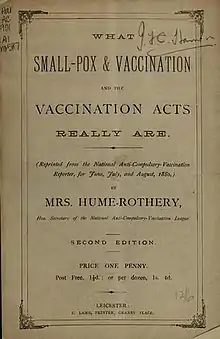Mary Hume-Rothery
Mary Hume Rothery or Mary Catherine Hume-Rothery (14 December 1824 – 14 February 1885) was a British writer and campaigner for medical reform. She campaigned against the Contagious Diseases Act and founded the National Anti Compulsory Vaccination League.
Mary Hume Rothery | |
|---|---|
| Born | 14 December 1824 London |
| Died | 14 February 1885 (aged 60) Cheltenham |
| Nationality | United Kingdom of Great Britain and Ireland |
Life
Rothery was born in London in 1824. Her parents were Mary and Joseph Hume, she was their youngest daughter and Allan Octavian Hume was her brother. Her father was a member of parliament who was concerned with the British Museum and was a founder of University College, London.[1] Her mother, also Mary, was the daughter of Hardin Burnley. She married the Reverend William Hume and the two of them adopted the name Hume-Rothery in 1866 which was the surname of their son James Hume Rothery when he was born in 1866. She and her husband had lived near Hexham in the 1860 where William was the curate, before they moved to south-west England to live at Cheltenham.[2]

She wrote and published a biography of Charles Augustus Tulk and an explanation of his ideas. Tulk was a friend of her father's who had persuaded her to become a Swedenborgian. He was not a member of this New Church, but his writings on the church founder's ideas about the 'law of correspondence' were addressed to the church members.[2]
In 1871 Rothery published Women and Doctors; Or, Medical Despotism in England. Its key message was to resist government control of medicine that was discriminating against medicine that that was not from trained doctors.[3] Her mentor, Tulk, was an enthusiast for phrenology and mesmerism.[2] Rothery also campaigned against men getting involved in the treatment of women when it came to gynaecological examinations and she objected to men becoming midwifes.[4] Her solution to this was to encourage women to become doctors and she forwarded this idea and the introduction of women's suffrage in her 1870 publication A Letter Addressed to the Right Hon. W. E. Gladstone.[2] This fitted in with idea that it was male doctors who had assisted with the Contagious Diseases Act that blamed prostitutes for the spread of sexual disease. She was opposed to this act[4] and Rothery was an invited speaker at Josephine Butler's Ladies' National Association.[2]
In 1874 she and William founded the National Anti Compulsory Vaccination League (NACVL). Her husband led the Anti-vaccination organisation and she was the honorary secretary. For some years Cheltenham became the centre of the national movement opposing vaccination and Mary edited the magazine that was organised. In 1876 William gave up his religious orders.[5] Their organisation was eclipsed by the London Society for the Abolition of Compulsory Vaccination in the 1880s.[2]
Rothery died in Cheltenham in 1885.
References
- "William Hume-Rothery, 1899-1968". Biographical Memoirs of Fellows of the Royal Society. 15: 109–139. 1969-11-30. doi:10.1098/rsbm.1969.0006. ISSN 0080-4606. S2CID 72451114.
- "Rothery, Mary Catherine Hume- (1824–1885), campaigner for medical reform and author". Oxford Dictionary of National Biography (online ed.). Oxford University Press. 2004. doi:10.1093/ref:odnb/49483. Retrieved 2020-05-28. (Subscription or UK public library membership required.)
- Women and Doctors; Or, Medical Despotism in England. A. Heywood. 1871.
- Kent, Susan Kingsley (2014-07-14). Sex and Suffrage in Britain, 1860-1914. Princeton University Press. p. 121. ISBN 978-1-4008-5863-7.
- Durbach, Nadja (2005). Bodily Matters: The Anti-Vaccination Movement in England, 1853–1907. Duke University Press. ISBN 978-0-8223-3423-1.